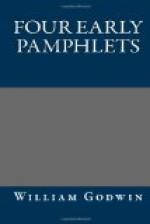Many of the articles I have mentioned, serve to compose the pedantry of history. Than history, no science has been more abused. It has been studied from ostentation; it has been studied with the narrow views of little minds; it has been warped to serve a temporary purpose. Ingenious art has hung it round with a thousand subtleties, and a thousand disputes. The time has at length arrived, when it requires an erect understanding, and a penetrating view, above the common rate, to discover the noble purposes, which this science is most immediately calculated to subserve.
In a word, the fate of history has been like that of travelling. The institution has been preserved, but its original use is lost. One man travels from fashion, and another from pride. One man travels to measure buildings, another to examine pictures, and a third perhaps to learn to dance. Scarcely any remember that its true application is to study men and manners. Perhaps a juster idea cannot be given of the science we are considering, than that which we may deduce from a reflection of Rousseau. “The ancient historians,” says he, “are crowded with those views of things, from which we may derive the utmost utility, even though the facts that suggest them, should be mistaken. But we are unskilled to derive any real advantage from history. The critique of erudition absorbs every thing; as if it imported us much whether the relation were true, provided we could extract from it any useful induction. Men of sense ought to regard history as a tissue of fables, whose moral is perfectly adapted to the human heart.”
The mere external actions of men are not worth the studying: Who would have ever thought of going through a course of history, if the science were comprised in a set of chronological tables? No: it is the hearts of men we should study. It is to their actions, as expressive of disposition and character, we should attend. But by what is it that we can be advanced thus far, but by specious conjecture, and plausible inference? The philosophy of a Sallust, and the sagacity of a Tacitus, can only advance us to the regions of probability. But whatever be the most perfect mode of historical composition, it is to the simplest writers that our youth should be first introduced, writers equally distant from the dry detail of Du Fresnoy, and the unrivalled eloquence of a Livy. The translation of Plutarch would, in my opinion, form the best introduction. As he is not a writer of particular elegance, he suffers less from a version, than many others. The Roman revolutions of Vertot might very properly fill the second place. Each of these writers has this further recommendation, that, at least, in the former part of their works, they treat of that simplicity and rectitude of manners of the first Greeks and Romans, that furnish the happiest subject that can be devised for the initiating youth in the study of history.




